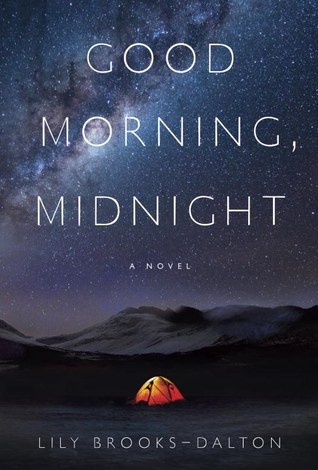 Wow, what a lovely book! With both a cover and a plot evocative of the equally-lovely Station Eleven from a few years ago, Good Morning, Midnight looks at a few individuals left alive, for various reasons, after the mysterious end of human civilization in the rest of the world. In fact, the writing styles and feel are so similar that it's easy to imagine that this book takes place in the same world as Station Eleven, just in different physical locations on it.
Wow, what a lovely book! With both a cover and a plot evocative of the equally-lovely Station Eleven from a few years ago, Good Morning, Midnight looks at a few individuals left alive, for various reasons, after the mysterious end of human civilization in the rest of the world. In fact, the writing styles and feel are so similar that it's easy to imagine that this book takes place in the same world as Station Eleven, just in different physical locations on it.There are two halves to this book that are told in alternating chapters. First, astronomer Augie has been left alone--or almost alone--at an observatory in the Arctic Circle after he refused to evacuate with the rest of the staff. He planned to live out his last days in solitude, until he discovers a young girl, maybe nine or ten years old, named Iris and who appears to have been forgotten during the evacuation. Augie and Iris try to make a life in the observatory in the silence that the rest of the world has left behind. Meanwhile, Sully is a communications specialist aboard the Aether, a ship completing the first manned mission to Jupiter and its moons and which is now on its way back to Earth--but they know something is wrong, because Earth has gone silent. Told over the course of a year, the book is very much a tale of people searching for purpose when the lives that they have known are suddenly, completely, and irrevocably changed.
There are no zombies to fight here, no nuclear hazard zones, no diseases to outrun. The apocalypse, whatever it was, happened and then was done. We don't know what caused it. We just know that something happened, and now the world is silent. Augie appears to be the last man on Earth, though it's hard to imagine he actually is; certainly other isolated spots would have survived, like maybe in the Antarctic research stations, out in Siberia, high in the mountains--something. Maybe Augie is just the last man on earth who knows how to use a ham radio. The writing is simple and beautiful, relying on two extraordinary settings to showcase a story of survival and belonging. There's some funny business going on in the background that I started to suss out fairly early, but I wasn't quite on track with exactly what it was until close the end, which was nice. There is a very ambiguous ending--it clears up one part, which is the part that I'd been poking about, but what ultimately happens to some of the characters is left up to the reader to decide, something that I think probably has to be done in a book of this nature and with this particular plot.
It's not a long book, but it was an absolute joy to read. The characters have depth and dimension and are so perfectly suited for their roles; the settings are evoked with beautiful prose; and the whole thing has such a lovely feel to it that I didn't want it to end. Is some of the science squishy? Yes, very. But this isn't meant to be the next of kin to Andy Weir's The Martian. It has an entirely different focus and purpose, and with that in mind is set at some point in the future where science has advanced somewhat, making a trip to Jupiter possible in a year and having Voyager I go offline, along with its successors including the fictional Voyager III. It's not supposed to be a "hard" science book though it definitely falls into the sci-fi genre. With that in mind, I think it can be forgiven for its squishy science, because the rest of the book more than makes up for that.
I absolutely loved this, and after a string of books recently that were only "okay," it was a pleasure to read.
5 stars out of 5.
No comments:
Post a Comment